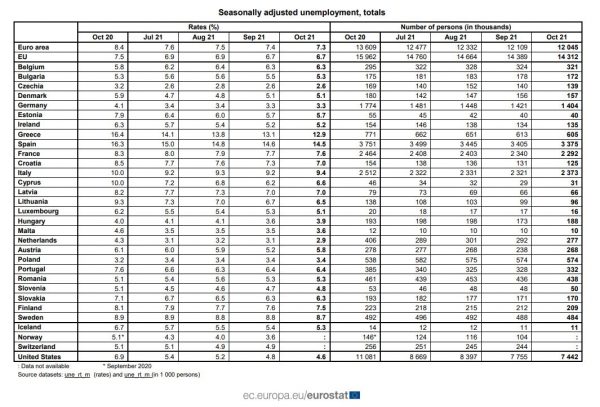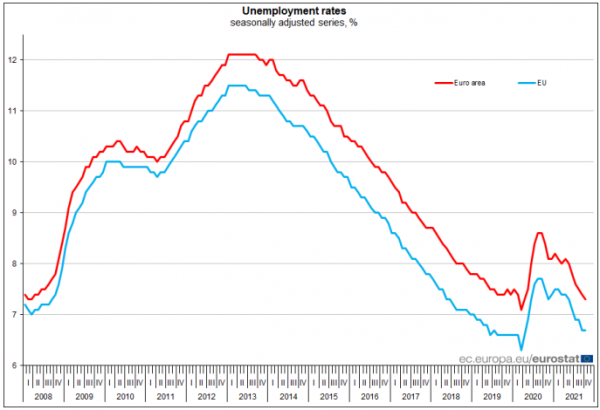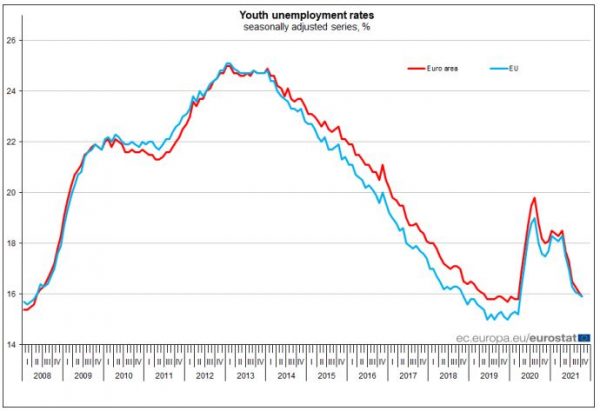
In October 2021, the euro area seasonally-adjusted unemployment rate was 7.3%, down from 7.4% in September 2021 and from 8.4% in October 2020. The EU unemployment rate was 6.7% in October 2021, stable compared with September 2021 and down from 7.5% in October 2020. These figures are published by Eurostat, the statistical office of the European Union. 
At the same time, there was a large drop in unemployment in Greece to 12.9% year on year from 16.4% in the corresponding period last year.
Eurostat estimates that 14.312 million men and women in the EU, of whom 12.045 million in the euro area, were unemployed in October 2021. Compared with September 2021, the number of persons unemployed decreased by 77 000 in the EU and by 64 000 in the euro area. Compared with October 2020, unemployment decreased by 1.650 million in the EU and by 1.564 million in the euro area.
Youth unemployment
In October 2021, 2.905 million young persons (under 25) were unemployed in the EU, of whom 2.367 million were in the euro area. In October 2021, the youth unemployment rate was 15.9% in both the EU and the euro area, down from 16.0% in the EU and from 16.1% in the euro area in the previous month. Compared with September 2021, youth unemployment decreased by 2 000 in the EU and by 9 000 in the euro area. Compared with October 2020, youth unemployment decreased by 165 000 in both the EU and the euro area.
Unemployment by gender
In October 2021, the unemployment rate for women was 7.0% in the EU, down from 7.1% in September 2021. The unemployment rate for men was 6.4% in October 2021, down from 6.5% in September 2021. In the euro area, the unemployment rate for women decreased from 7.8% in September 2021 to 7.7% in October 2021, while the unemployment rate for men remained stable at 7.0%.
Additional labour market indicators
These estimates are based on the globally used International Labour Organisation (ILO) standard definition of unemployment, which counts as unemployed people without a job who have been actively seeking work in the last four weeks and are available to start work within the next two weeks. The COVID-19 outbreak and the measures applied to combat it have triggered a sharp increase in the number of claims for unemployment benefits across the EU. At the same time, a significant part of those who had registered in unemployment agencies were no longer actively looking for a job or no longer available for work, for instance, if they had to take care of their children. This leads to discrepancies in the number of registered unemployed and those measured as unemployed according to the ILO definition.
To capture in full the unprecedented labour market situation triggered by the COVID-19 outbreak, the data on unemployment have been complemented by additional indicators, e.g. underemployed part-time workers, persons seeking work but not immediately available and persons available to work but not seeking, released together with LFS data for the second quarter of 2021. LFS data for the third quarter of 2021 will be released on 13 January 2022.
What is happening in Greece
Unemployment in Greece fell further in October, a decline that brought the unemployment rate below 13%, according to the data.
According to the official statistics of the EU, the seasonally adjusted unemployment rate in October fell to 12.9%, from 13.1% in September and 16.4% compared to October 2020. This level is the second highest among the 27 EU member states, behind only 14.5% of Spain.
However, unemployment under the age of 25 did not decline, as it rose from 28.1% in September to 33.2% in October, a percentage that ranks Greece first, with Spain following with a percentage of 30.3%.
Regarding both sexes, the percentage of unemployed men remained at 9.8% in October, while among women it remained relatively high, but fell to 16.8%, from 17.1% in September.
Latest News

European Central Bank Cuts Interest Rates by 25 Basis Points
It is the fourth cut of interest rates by Europe’s central bank, a move expected by the markets and financial analysts leading to the rate settling at 3%.

Airbnb: New Measures Add €600 in Extra Costs for Property Owners
Property managers face an immediate administrative fine of 5,000 euros if access to the inspected property is denied or any of the specified requirements are not met.

Economist: Greece Included in the Best Performing Economies in 2024
Meanwhile, Northern European countries disappoint, with sluggish performances from the United Kingdom and Germany.

EasyJet Expands Its Routes from Athens
The airline’s two new routes will be to London Luton and Alicante and they will commence in summer 2025.

Capital Link Forum Highlights Greece’s Economic Resurgence; Honors BoG Gov Stournaras
Capital Link Hellenic Leadership Award recipient, Bank of Greece Gov. Yannis Stournaras, an ex-FinMin, was lauded for his pivotal role during Greece’s economic recovery

Tourist Spending in Greece Up by 14%, Visa Card Analysis Shows
Greece’s capital Athens emerged as the most popular destination, recording a 17% increase in transactions with Visa cards, surpassing even the cosmopolitan island of Mykonos.

Inflation in Greece Unchanged at 2.4% in Nov. 2024
The general consumer price index (CPI) posted a 0.4% decrease in November compared to the previous month

2024 Christmas Holidays: Extended Shop Hours Schedule
The 2024 Christmas Holidays extended shop hours schedule commences on Thursday, December 12 and runs until the end of the year.

ELSTAT: Seasonally Adjusted Unemployment Down in October
The number of employed individuals reached 4,284,694, an increase of 67,723 compared to October 2023 (+1.6%) and 22,002 compared to September 2024 (+0.5%).

Greek PM’s Chief Economic Adviser Resigns
In the post on his Facebook page, Patelis did not disclose the reasons that led him to step down.
















![Fraport: Πάνω από 35 εκατ. επιβάτες στα αεροδρόμια το 11μηνο – Πτώση στη Μύκονο [πίνακας]](https://www.ot.gr/wp-content/uploads/2022/06/fraport-90x90.jpg)



























 Αριθμός Πιστοποίησης Μ.Η.Τ.232433
Αριθμός Πιστοποίησης Μ.Η.Τ.232433